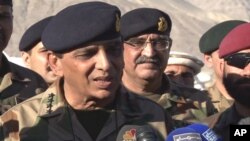Pakistan’s powerful military chief has made a rare call for the demilitarization of the Siachen Glacier, where thousands of Pakistani and Indian troops have been posted for nearly three decades. The call comes after some 140 people were buried by a massive avalanche that flattened a key military base in the disputed Himalayan region of Kashmir.
Since the avalanche struck a key Pakistani military base at Siachen nearly two weeks ago, army-led rescue teams have been working relentlessly at an altitude of 6,000 meters to retrieve the men, but have not succeeded so far.
The human tragedy in the glacial region has revived calls for Pakistan and India to end what many critics describe as a “senseless” standoff.
Speaking to reporters after visiting the disaster zone, Pakistan's army chief, General Ashfaq Parvez Kayani, said Wednesday his country is seeking resolution of all disputes with India, including the Siachen issue.
“This conflict should be resolved, but how it is to be resolved [is what] the two countries have to talk about, a peaceful co-existence between the two neighbors is very important so that everybody can concentrate on the well-being of the people. We in the army understand very well that there should be a very good balance between defense and development," said Kayani.
The conflict began in 1984 when India occupied the heights of the uninhibited glacier located on the northern tip of the military “Line of Control” dividing Kashmir. The Indian move prompted Pakistan to establish posts on Siachen.
General Kayani has dismissed growing calls for unilateral withdrawal of his forces from Siachen in light of the dispute's human and financial toll. He defends the deployment of Pakistani troops at positions as high as 6,700 meters.
“There should be no doubt we will do our duty and no cost or no reversal will ever deter us from doing that," he said. "Troops must withdraw - but then, of course, they are sitting for some reason and that reason was not Pakistan.”
It is estimated that the dispute over Siachen has claimed more than 8,000 lives on both sides of the border since it began in 1984. Of that number, less than 1,000 died in the fighting while the rest were killed by extreme weather conditions in the Siachen region.
India and Pakistan both spend hundreds of millions of dollars on maintaining troops on the glacier - money, critics say, that could be diverted to the public welfare if the dispute is settled.
News
Pakistan Army Chief Calls for Demilitarization of World Highest Battleground
- By Ayaz Gul




